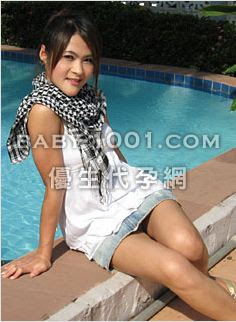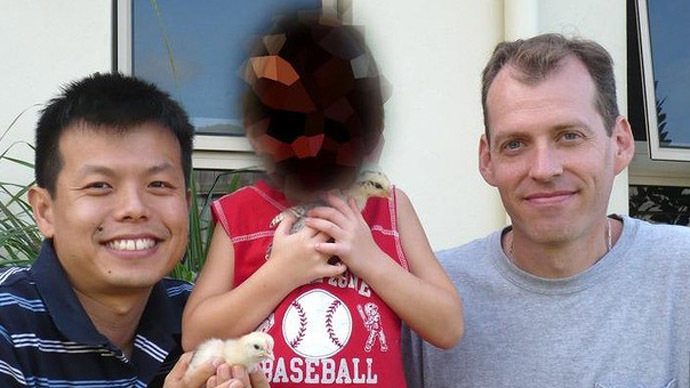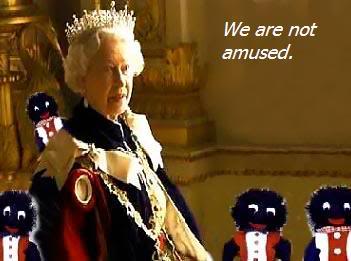Golliwog Surrogacy has become an elitist trend dependent on ‘womb rent’ exploitation of Third World mothers. Ethnic babies for cash?
It seem to have taken off since Madonna in 2006 made black babies the new black babies to show off.
Human trafficking and modern slavery are now the biggest criminal activity in the world. Their revenues eclipsing that of the illegal arms and drug trades. And it’s no wonder with even the unborn being unsafe from these sadistic flesh-traders. As if it isn’t enough to prey on the desperation and impoverishment of women, these corporate traffickers from Bangkok, Thailand offer the best baby your dollar can buy.
Recently, fourteen Vietnamese women were rescued from sexual slavery in the compound of a surrogate baby trafficking ring in Thailand. Nine of the fourteen women reportedly said that they had been lured to the operation with promises of large payments for giving birth as surrogates, while four said that they had been tricked, according to Major General Manu Mekmok, who leads immigration investigations in Thailand.
“This is illegal and inhuman. In some cases it looks like they were raped,” Public Health Minister Jurin Laksanawisit told the press.
Thai authorities said that the illegal company, called “Baby 101”, received orders by e-mail or via agents from childless couples offering thousands of dollars per newborn. In some cases, the male partner would also provide sperm to inseminate the women, who were being held in two houses in Bangkok and had their passports confiscated unless they agreed to cooperate as surrogate mothers. The Thai government discovered the ring after some of the women emailed the Vietnamese embassy.
“Baby 101”, which describes itself as a “eugenics surrogate” service, displays pictures of its surrogate mothers living in in the compound on its website. It boasts of the good looks and health of the male sperm donors and the female ovum donors (many of whom look to be in their teens); it shows the houses and hospitals in peaceful grounds with a swimming pool and high security. The women were paid 5,000 USD per baby, while clients paid 32,000 USD plus expenses.
 One of Baby 101’s “ovum donors” as featured on their website
One of Baby 101’s “ovum donors” as featured on their website
“We could create the finest procreation condition for your baby, mainly through the efficient embryo refining, only the superior left for implanting,” the company boasts on its website. It does not mention what becomes of human embryos that fail its eugenic standards.
“In the community where the accommodation is located, there are security lookout in every entrance, severely control the person and vehicles that pass in and out to the community, the guards routinely patrol around 24 hours a day all year,” the company also states, going on to tout a clean environment that is “safe for surrogates living inside.”
Commercial surrogacy is illegal in Thailand. Only close relatives can act as surrogates, and cannot receive payment. The Thai parliament is currently considering legislation that would apply stiff fines and long prison sentences to those convicted of operating surrogacy rings.
“We have to take the issue seriously, otherwise we will become a place for human trafficking involving surrogacy,” Jurin told reporters.
Four Taiwanese, one Chinese and three Myanmar nationals were arrested in connection with the business and charged with illegally working in Thailand. A 35-year-old Taiwanese woman, who police said ran the operation, was also charged with human trafficking.
Thai officials have shut Baby 101 down for now but with the money to be made from “boutique babies” it’s only a matter of time before there are more of these “baby farms”.
Australian laws need to prevent such exploitation and the current case of baby Gammy, the twin who was left behind because it is Down syndrome. The Australian buyers accepted his healthy sister.
Trafficking is made easier because the surrogacy industry has separated childbirth from motherhood. Anyone with money can surrogate from the Third World even pedophiles.
A Japanese businessman has reportedly managed to acquire 13 babies by surrogacy, nine of whom were kept in a nursery he sometimes visited. He intended to take them to Japan to run his business when they grow up.
Problems arise when single men or men in couples can buy children who will have no mother of any kind. These children may be acquired for the purposes of abuse, and there may be no woman with an interest in the child’s welfare around to protect that child.
The Australian buyer of the Thai child has a wife, but has been found to be a serious child sex offender, which raises questions about his intentions for the child. There are precedents of the creation of children for the specific purpose of sexual abuse. The father in the baby Gammy case has publicly denied this was his intention.
A Queensland male gay couple were imprisoned last year for, the police believe, creating a boy child by surrogacy specifically for abuse. The boy was acquired from a Russian surrogate mother and the abuse started shortly after birth. Sexual abuse of him was uploaded to a boy lovers’ site and he was taken around the world for abuse by other paedophiles.
The surrogacy industry not only rips apart the connection between motherhood and reproduction, but undermines the welfare of trafficked women and babies. It raises disturbing questions about what children are for, an end in themselves or to serve the purposes of their buyers.
Surrogacy industry entrepreneurs are campaigning to change the law in Australia, where only altruistic surrogacy is allowed. Their aim is to enable the commercial surrogacy industry to grow in this country.
 Convicted paedophiles Peter Truong and his partner Mark Newton, 42, born in the US, both Australian citizens, bought a newborn boy in Russia for US$8,000.
Convicted paedophiles Peter Truong and his partner Mark Newton, 42, born in the US, both Australian citizens, bought a newborn boy in Russia for US$8,000.
Nice.
In India in 1978, a girl named Kanupriya was born through IVF technology in Kolkata. Since then, commercial surrogacy, or “wombs for rent,” has become a growing business in India. In places like the Akanksha Infertility Clinic in Anand, women like Nandani Patel (above) are paid $5000 to $7000 to carry another couple’s child.
In our rapidly globalizing world, the growth of reproductive tourism is a fairly recent phenomenon. Increasing numbers of infertile couples from the U.S, Britain, Australia and other countries are looking for surrogate mothers in India, where an English-speaking environment and cheaper services are attractive incentives for those exploring surrogacy as a fertility option.

